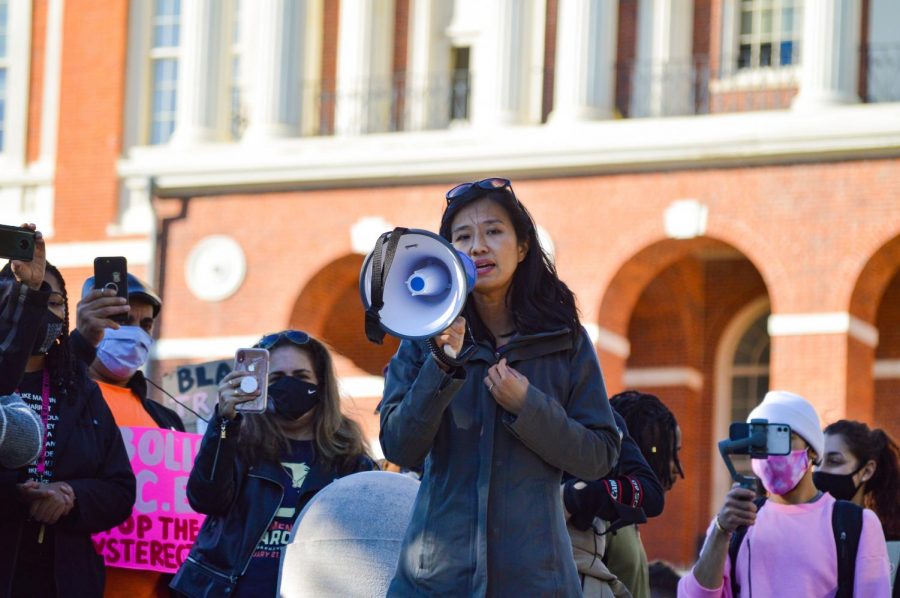Michelle Wu calls for increased coordination between city services, Boston communities at press conference for student journalists
Boston mayoral candidate Michelle Wu said she will prioritize community connections, the COVID-19 vaccine rollout and eliminating barriers faced by minority groups if elected mayor.
February 19, 2021
Boston mayoral candidate and City Councilor Michelle Wu held a virtual press conference for student journalists Feb. 13 to discuss her plans to increase coordination in communities and city departments in order to handle some of the most pressing issues the city faces, including COVID-19 vaccinations and economic recovery.
Wu said that if elected, her first objective will be strengthening the links between communities and city services and within city departments themselves.
“My number one priority is making sure that we build a connected city,” Wu said. “That means connecting people to each other and providing the support for families to be connected, for neighborhoods and communities to be connected, but also that we’re connecting the ways in which our departments work and our city services are structured to recognize how intersectional our issues are as well.”
A number of the issues residents face — such as access to quality education, food, healthcare and transportation — are impacted by what neighborhood they live in, Wu said.
“If you look at the outcomes across our communities, more often than not, the health, educational access, food access, economic opportunity, is tied to where you live in the city,” Wu said. “Your zip code is often so closely linked to so many factors that determine opportunity and stability.”
Wu pointed to research that found that the life expectancy of Boston residents drops by 30 years in Roxbury compared to Back Bay, as well as the finding that Black bus riders in the city spend 64 more hours a year on the bus than white bus riders.
The best way to begin reconciling these inequities, Wu said, is by “breaking down silos in City Hall” and aligning city resources on those issues.
“We need to make sure that every community feels connected to the outcomes and the success and the opportunity in every other community,” she said.
One of the most immediate places the city needs to do this with is the rollout of the COVID-19 vaccine, Wu said.
“This is the most urgent thing we could be doing right now … to make sure everyone is protected and to end the pandemic by rolling out vaccinations in a fast and an urgent, accessible, equitable way,” she said.
In order to do this, Wu advocated for the creation of a telephone hotline — launched by the state Feb. 12 — for residents to register to get the vaccine to streamline the process and ensure those without access to internet could sign up. Wu is also calling for the creation of vaccination sites in every residential zip code in Boston, with hours that “fit families’ lives,” including hours in the early mornings, evenings and on the weekends. Currently, there are vaccination sites in Roxbury, Dorchester, the Fenway, Mattapan and South Boston.
Combatting the effects of the pandemic will mean more than mass vaccinations, however. Wu also said she has been pushing to understand the city’s COVID-19 emergency spending.
“In my role as a city councilor, we have been ensuring that the actions and funding through the city won’t just be band-aids on the immediate crisis, but actually align with the underlying structural change that we need to see,” Wu said.
It’s an issue that is closely tied with work Wu has done on the City Council to increase equity in the contracting processes for the city’s discretionary spending. In 2017, Wu co-sponsored an ordinance with then City Councilor Ayanna Pressley requiring the city to create a supplier diversity program and increase outreach to women-owned and minority businesses.
Historically, only a small percentage of the city’s contracts have gone to businesses owned by people of color or women. A recent report obtained by the Boston Globe found that between 2014 and 2019, only 1.2% of the city’s $2.1 billion in contracts went to Black- and Latinx-owned businesses. Wu said only one contract during the pandemic went to a locally-owned Boston-based business of color.
“There’s a lot of work to do in not just standing up for relief and getting residents the resources they need as quickly as possible,” Wu said. “But also these underlying issues around closing the racial wealth gap and ensuring equity in all the decisions and actions being taken now.”
If elected, Wu will not only be Boston’s first Asian-American mayor, but also the first non-native Bostonian mayor since Malcom Nichols took office in 1926.
“I love this city like someone who learned it from scratch,” said Wu. “And having served the entire city for over seven years now, I’m excited to be able to break down even more of these silos and connect all of our communities together.”







